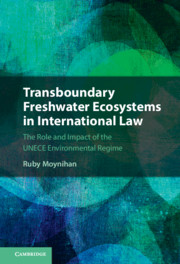 Transboundary Freshwater Ecosystems in International Law
Transboundary Freshwater Ecosystems in International Law Its Contribution to Procedural Justice and Intra-generational Equity in a Water Scarce Future
Published online by Cambridge University Press: 01 October 2021
A rapidly deteriorating supply of healthy freshwater resources, exacerbated by climate change, intensifies social and economic injustices and inequalities across the world. Strong public laws and institutions upholding equitable procedures for public participation, access to justice and information regarding the fair distribution of access to sufficient water resources are needed more than ever to protect the most vulnerable. International water law and river basin treaties have poor provisions for public participation. This chapter demonstrates how the UNECE environmental regime, especially through the Aarhus Convention and Protocol on Water and Health, provides a comprehensive framework for the principle of public participation, access to justice and information, including identifying where it fills gaps in international water law and basin treaties. For example, non-state actors including the public and non-governmental organisations (NGOs) have limited almost non-existent rights under the 1997 UN Watercourses Convention beyond the procedure on non-discriminatory access to justice. In contrast, the public including NGOs are given a significant participatory role in law making, implementation and enforcement in the UNECE water regime. This contributes to procedural justice and the principle of intra-generational equity in international water law. The Water Convention, however, should be amended to provide for all three pillars of public participation.
To save this book to your Kindle, first ensure [email protected] is added to your Approved Personal Document E-mail List under your Personal Document Settings on the Manage Your Content and Devices page of your Amazon account. Then enter the ‘name’ part of your Kindle email address below. Find out more about saving to your Kindle.
Note you can select to save to either the @free.kindle.com or @kindle.com variations. ‘@free.kindle.com’ emails are free but can only be saved to your device when it is connected to wi-fi. ‘@kindle.com’ emails can be delivered even when you are not connected to wi-fi, but note that service fees apply.
Find out more about the Kindle Personal Document Service.
To save content items to your account, please confirm that you agree to abide by our usage policies. If this is the first time you use this feature, you will be asked to authorise Cambridge Core to connect with your account. Find out more about saving content to Dropbox.
To save content items to your account, please confirm that you agree to abide by our usage policies. If this is the first time you use this feature, you will be asked to authorise Cambridge Core to connect with your account. Find out more about saving content to Google Drive.